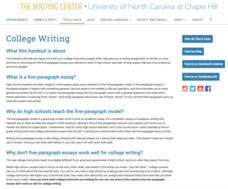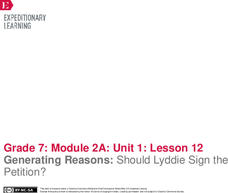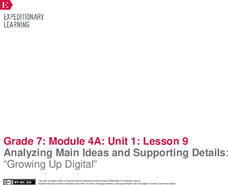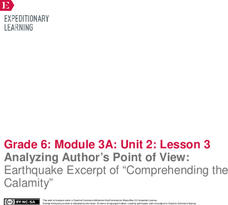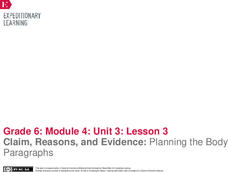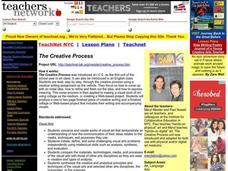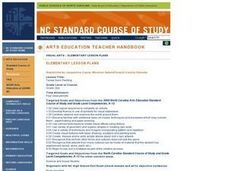University of North Carolina
College Writing
No matter how difficult high school writing may seem, college writing presents challenges of its own. The fourth in a series of 24 handouts from The Writing Center at UNC breaks down the expectations for college writing. Scholars learn...
Open Oregon Educational Resources
Oregon Writes Open Writing Text
Are some resource books more confusing than helpful? The creator of Oregon Writes Open Writing Text thinks so. That is why the text remains a living document with input from teachers, librarians, and scholars. The eBook begins with...
Reed Novel Studies
The Year of Billy Miller: Novel Study
Can you really knock the sense into someone? It seems that the bump on Billy's head changed his perspective on things in The Year of Billy Miller. Readers discover that after his injury, Billy appreciates his parents more and is nicer to...
Reed Novel Studies
The River: Novel Study
Some experiences are worth living again. At least, that is how government researchers feel about Brian's survival experience in the woods. The River is a sequel to Brian's adventures in Hatchet. Scholars read about the troubles Brian and...
EngageNY
Generating Reasons: Should Lyddie Sign the Petition?
Scholars synthesize evidence from Katherine Paterson's Lyddie to create a list of the pros and cons of Lyddie signing a petition about working conditions. They use the Lyddie's Decision anchor chart to record their thoughts and ideas...
EngageNY
Analyzing Main Ideas and Supporting Details: “Growing Up Digital”
Young scholars continue their exploration of adolescent brain development by reading an informational text, "Growing Up Digital," by Matt Richtel. Then, with partners, they complete note-catcher worksheets to capture the article's main...
EngageNY
Gathering Information about Screen Time: Assessing and Reading Internet Sources, Day 2
Calling all researchers! Using the resource, scholars continue conducting independent Internet research about a chosen research question. As they browse the web in search of articles to answer their questions, pupils paraphrase their...
EngageNY
Contrasting Authors’ Use of Evidence: Bottled Water
Apples to oranges, Dasani to Aquafina. Using a Venn diagram, scholars contrast two authors' use of evidence on the topic of bottled water. Additionally, they continue reading Charles Fishman's The Big Thirst and answering text-dependent...
EngageNY
Gathering Information about Water Management: Assessing and Reading Internet Sources, Day 2
Accuracy, credibility, timeliness ... it's time to act on source reliability! Pupils continue conducting Internet research, selecting two questions about water management from their researcher's notebooks that they want to explore...
EngageNY
Writing to Show, Not Tell: Dialogue, Sensory Words, and Strong Action Verbs
Consume, gobble, devour ... serving up strong verbs! Writers focus on using dialogue, strong action verbs, and sensory details in their writing. After analyzing a model narrative, they apply their learning to their own hero's journey...
EngageNY
Researching Part 2: Reading for Gist and Gathering Evidence Using the Researcher’s Notebook
The gist should be short and sweet! Pupils practice finding the gist of an informational text and then write a summary of the text. Next, they gather with their research teams to discuss a focus question based on the novel Bud, Not Buddy...
EngageNY
End of Unit Assessment, Part 2: Drafting Introduction and Conclusion of a Narrative
First and last impressions matter. Scholars compose the introductory and concluding sections of their narrative writing assignments. Also, to prepare for an upcoming performance task, pupils watch a modern-day monologue from the movie...
EngageNY
Introducing The Lost Garden and Finding Evidence of Laurence Yep’s Perspective on What It’s like to Fit into Another Culture on Pages 66– 67 of Dragonwings
How does culture shape perspective? Pupils consider the question as they read an excerpt from Laurence Yep's autobiography, The Lost Garden. Using a graphic organizer, they gather textual evidence and make inferences about the author's...
EngageNY
Analyzing Author’s Point of View: Earthquake Excerpt of “Comprehending the Calamity”
How do authors convey their points of view? Using the resource, scholars read an excerpt from a primary source document about the 1906 San Francisco earthquake. Then, they complete graphic organizers to analyze the author's point of view.
EngageNY
Claim, Reasons, and Evidence: Planning the Body Paragraphs
Planning is the key to success. Scholars continue planning their essays by adding reasons to their Planning My Argument graphic organizers. Additionally, pupils analyze a body paragraph from a model position paper, identifying the...
Curated OER
Eric Carle Collage
Students gain appreciation for the work of Eric Carle. They speculate about a work of art, what materials, techniques and skills were used. They study Carle's work to determine how he did it and explore various water color techniques.
Curated OER
The Creative Process
High schoolers conceive and create works of visual art that demonstrate comprehension of how the communication of their ideas relates to the media, techniques, and processes they use. They initiate, define, and solve challenging visual...
Curated OER
Introduction To Film Editing
Students are introduced to the role of a film editor and to two common film-editing techniques: continuity editing and montage (discontinuity) editing. By viewing video clips, students identify and define these two editing styles.
Curated OER
See Spot Run
Students identify several properties of water as a universal substance, describe the composition of several complex color mixtures and separate the components of dye using chromatographic technique.
Curated OER
Ceramic Draped Slab Masks
Students will compare and contrast various forms of artistic expression associated with specific groups of people, geographic regions, or time periods. Investigate processes and beliefs used by various cultures and institutions, past and...
Curated OER
Beginning Weaving on a Cardboard Loom
Students create examples of weaving techniques. They create a sampler that demonstrates tive different techniques. Students use colors, textures, and motifs with personal or cultural significance using a variety of materials.
Curated OER
Tansai Sumi Painting
First graders study Japanese art and apply the technique of Tansai Sumi (lightly colored) to create individual works of art. Painting, design, lines, and drawing techniques are covered in this 1st grade lesson.
Curated OER
Judging a Book by Its Cover
Students explore the relationship between the form of books and the content inside. For this book exploration lesson, students use a piece of their creative writing as inspiration; they author a written book and design a cover that...
Curated OER
Identifying Figurative Language From Edgar Allan Poe
In this figurative language worksheet, students identify the figurative language technique being used in each of the 10 sentences. The sentences are based on Edgar Allan Poe's literary work.


